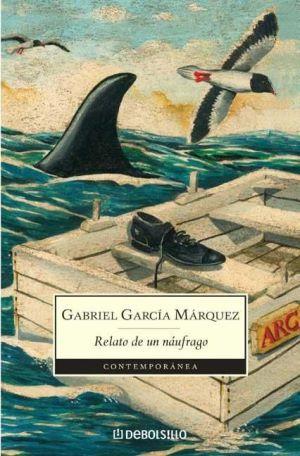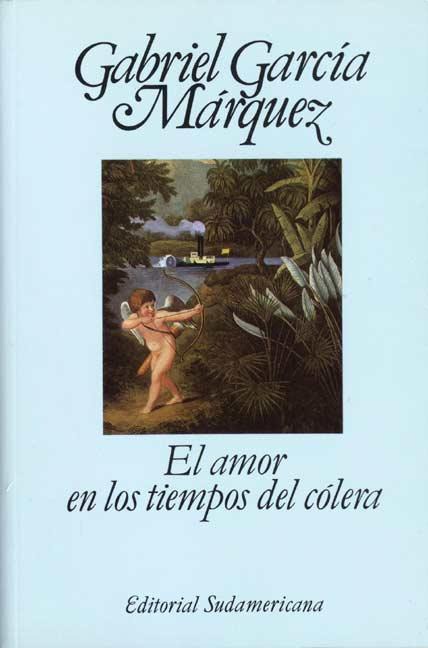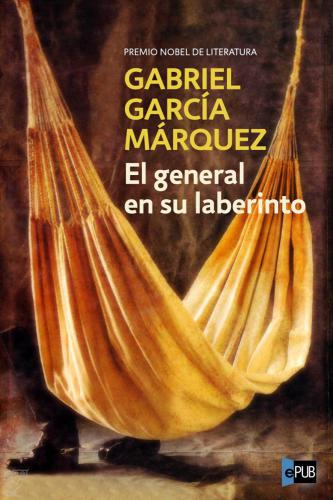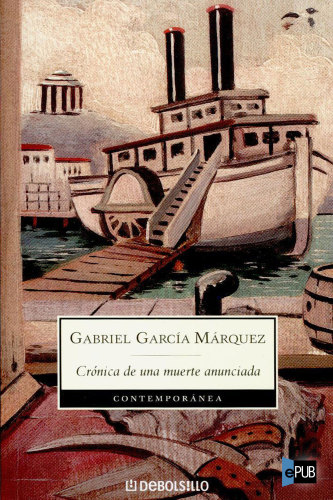oleebook.com
Relato de un Náufrago de Márquez, Gabriel García
de Márquez, Gabriel García - Género: Ficcion
Sinopsis
Relato de un náufrago es una novela de Gabriel García Márquez, basada en un hecho real y publicada en formato de libro en 1970, que narra la historia de un marinero colombiano que durante una tempestad cayó al mar y sobrevivió durante diez días sin comer ni beber en una balsa a la deriva. Cuando fue rescatado, el régimen militar de Colombia lo proclamó héroe nacional.
Gabriel García Márquez, por entonces periodista en el diario El Espectador, fue el encargado de cubrir la historia y entrevistar al marino rescatado. El reportaje fue publicado en episodios en 1955, pero García Márquez descubrió, durante sus conversaciones con el sobreviviente, que la nave militar no había naufragado por culpa de la tormenta, sino porque llevaba una carga de contrabando que, mal estibada, se desplazó a causa de un bandazo provocado por el viento, arrastrando al mar a ocho miembros de la tripulación.
Libros Recomendados - Relacionados
Reseñas Varias sobre este libro
This is entertaining high fantasy. The main character is in his mid-twenties, and already a skilled mage, although due to the rarity of his talent, largely self-taught. Most of the characters are predictable, but likable. The fantasy kingdom is in increasing peril from magic and intrigue, and the main character plays a role in defending it, along with his friends. The major conflict of this novel is resolved, but a longer struggle is just beginning.
The book suffers from several mistakes, wrong words and awkward phrases, but the action is fast enough that the meaning is clear. There rarely surprises in the rather conventional fantasy, but the combination of magical and physical combat is pretty exciting. For the most part, the titular Death Mage is the viewpoint character, but several chapters show other viewpoints, which allows a broader look at the struggle at the cost of loss of momentum. There is a romance subplot, but it's a minor element, and barely adds complexity to the plot.
On the whole, I will be reading the second book when and if it shows up.1 A19
Fun, but a little shallow
I did enjoy the book, but there were some glaring flaws.
The primary romantic interest is less than two dimensional, she has a history but no personality. The protagonist wants to learn more, but stops for seemingly no reason. The explanation for a certain spell relies on their being human remains always nearby, which is pretty rediculous as really even bones decay when left to the elements..
Raja Velloo21 14
This book had the most unrealistic romance ever and was overall not a good read. Michael Burnett976 5
Great book
Great book I can't wait to read the next book in the series I would recommend this author to anyone Jesse Burk39 3
This story was really amazing! It had plenty of action while still keeping me engrossed in the story. The author gave this story so much potential that I can't wait to see what happens next.
Things to note (spoilers):
Adriana - I really d Adriana's character, however, her relationship with Jaxom seemed really rushed to me so I was kind of turned off by it, but only a little bit. I am kind of holding out hope that Jaxom will somehow end up with Celia. On the other hand, if the author was trying to keep any love triangles from interfering with the story and ends up keeping Jaxom and Adriana together, I am totally okay with that as well.
Jaxom's abilities - I was so enthralled in the story whenever Jaxom figured out a new ability in his magic that my mind couldn't help but wander and imagine different ways his magic could be used. For example: Jaxom's sword has the ability to absorb magic and throw it back at an enemy. Well, Jaxom always had someone else's magic be absorbed into the sword. Rather than having someone else do it, he could gradually seep the power of the blight into the sword as to not weaken himself any and be able to send forth a giant blight attack. Then, after throwing the massive blight into the enemy, Jaxom could guide the blight throughout the enemy to finish them off quickly. (He could also merge the power of the blight in his sword along with another form of magic to have a combined attack.)
The forgotten city - The dead corpses that were controlled by Alimar to bring Jaxom and his friends into the city were all supposed to be dead death mages (and the risen are supposed to retain their magic abilities), but when Jaxom's group fought back none of them used the power of death to defend themselves. Obviously they wouldn't want to attack with magic because Alimar wanted them alive, but they could have defended themselves with magic at least. (This is just a minor detail I remembered, it really has no baring on the actual story.)
All in all, this was an amazing story and I am super excited to read the second book. Danny Evenson5 2
Great book. Really d the magic system used by the protagonist, which isn't used in most magic fantasies.I had to wait for it for a while, while the errors and typos were fixed, but its back up on Amazon now. Can't wait for the sequel as the first book has given the series a lot of content to explore.The protagonist was likable without being OP, or the very personification of gallantry or modesty, un some other fantasies. The other viewpoints were actually interesting instead of the boring bit in between the fun stuff the main character was doing.
Has other magic in the book which are explored, but could be explained more further on as while the death mage needs death, for the most part, the others, in particular fire, can kind of just go for as long as they want. That's the only real query i had, and even that was more of a nitpick. It could also be longer, but this was the authors first book so surprisingly good for a first book. Kathy458 5
This was a fairly simple story of sword and sorcery that I felt still needed a lot of work by the author. Most of the characters had a one dimensional feel to them and the society the story took place in only vaguely described. As a result the characters actions did not really seem to take place within in a cultural context that more experienced authors manage to invoke without necessarily have to spell it out in large explanation paragraphs.
Unfortunately, by the end of the book I didn't have any real attachment to the characters and don't feel any real urgency to get book 2 when it is published. Also the book has a number of errors with missing words etc so if this bothers you then you've been warned.
scherrycusick31 2
Death Mage, What is that you ask.
Fantasy is one of my favourite type of read, I was reading it way before it became so popular. I tried this one because I've never read about a death mage. I am so glad I did. Enjoyed the book and the characters. Our mage is one of the good guys. Looking forward to the next book. I recommend you read this and enjoy a new adventure. Joseph Triple Knight1 review
I loved this book. It was excellent. The system of magic was what is frequently seen in books these days, but the back story and writing were very to my liking.
I could identify with the main character, as he is someone who is out of the norm, but still has good friends.
All in all, a great read. I am waiting for the next book. Adamg2
Eager to see where the story goes.
A good beginning. Good story. Interesting characters. The death magic was new and interesting. Looking forward to the next chapter. Aleada1 review
Loved it! GaiusPrimus787 85
Cool story and a magic system that seems to be thought out. So many typos though! I know this is a self-publish, but Mr. Bender, get more people to read it before hand.
Chase1 reviewRead
Vivid.
1955, Caribbean Sea. Twenty years old soldier Luis Alejandro Velasco is part of the crew on board destroyer Caldas, traveling from the United States to Colombia. His life unexpectedly turning when a giant wave sent him and several of his mates flying to the sea, where he remained lost with little hope of being rescued.
A wondrous tale of survival based on true events, of how Velasco managed to survive lost at sea without food or water, in a poor state raft. Finally getting to safety when he reached beach shores ten days later, barely alive. A grand personality in his time, Velascos later life as much bleak as this fantastic tale, that launched Gabriel Garcia Marquez into stardom, and exile.
Another all-time classic by the immortal Gabo. A book probably every kid in Argentina had to read it at some point in school. After re-skimming it again decades later I can say that, although highly memorable, this is not one of my most favs of Marquez. Still, Ill never forget how Velasco had to watch several of his friends die, only few meters away and still unable to help them; the two encounters with the seagulls were both endearing and tearing. and also I'll never be able forget how he tried to eat a shoe in order to survive. Now thats commitment!
-----------------------------------------------
PERSONAL NOTE :
[1955] [172p] [Classics] [Almost Recommendable]
-----------------------------------------------
????? Chronicle of a Death Foretold.
????? Of Love and Other Demons. [3.5]
????? The Autumn of the Patriarch. [3.5]
????? The Story of a Shipwrecked Sailor.
????? No One Writes to the Colonel. [2.5]
????? Strange Pilgrims: Twelve Stories.
-----------------------------------------------
Vívido.
1955, Mar del Caribe. El soldado Luis Alejandro Velasco de veinte años es parte de la tripulación del ARC Caldas, viajando desde Estados Unidos a Colombia. Su vida inesperadamente dando un vuelco cuando una ola gigante lo manda volando a él y varios de sus compañeros al mar, donde permanece perdido con poca esperanza de ser rescatado.
Una maravillosa historia de supervivencia basada en eventos reales, sobre cómo Velasco logró sobrevivir perdido en alta mar sin comida ni agua, en una balsa en pobre estado. Finalmente llegando a seguridad cuando alcanzó la costa de la playa diez días después, apenas vivo. Una gran personalidad de su época, la vida de Velasco luego del incidente tan sombría como este relato fantástico, que lanzó a Gabriel García Márquez al estrellato, y exilio.
Otro clásico de todos los tiempos por el inmortal Gabo. Un libro que probablemente todo niño en Argentina tuvo que leer en algún momento en el colegio. Después de revisarlo décadas después puedo decir que, aunque altamente memorable, este no es uno de mis más preferidos de Márquez. Igual, nunca voy a olvidar como Velasco tuvo que ver morir a varios de sus amigos, a tan sólo un par de metros y aun así impedido de poder ayudarlos; los dos encuentros con las gaviotas fueron enternecedores y desgarradores, y tampoco jamás podría olvidar como él trató de comerse un zapato para sobrevivir. ¡Eso sí que es voluntad!
-----------------------------------------------
NOTA PERSONAL :
[1955] [172p] [Clásicos] [Casi Recomendable]
-----------------------------------------------classics memoir non-fiction464 s1 comment Ahmad Sharabiani9,564 7,526
Relato de un Náufrago = The Story of a Shipwrecked Sailor, Gabriel García Márquez
This is Marquez's account of a real-life event. In 1955, eight crew members of the destroyer Caldas, were swept into the Caribbean Sea. The sole survivor, Luis Alejandro Belasco, told the true version of the events to Marquez, causing great scandal at the time.
????? ?????? ?????: ??? ??????? ??? ?????? ???1982??????
?????: ?????? ?? ????? ???????: ?????? ?????? ?????? ?????: ??? ??????? ?? ??? ?????? ??? ???1359? ??147?? ????? ??? ???? ?????? ??????? ???1368? ??102?? ??? ??? ???1383? ??146?? ????9644482492? ??? ????? ???1387? ????9789643382496? ?????: ????????? ????????? ?????? - ???20?
?? ???1970??????? ????? «?????» ?? ?????? «????? ??????» ?? ????? ?? ????? «?????? ?? ????» ????? ??? ?? ????? «?????» ??? ??? ?? ?? ???? ? ??? ????? ???? ?????? ???? ??? ????? ???? ?? ???? ???? ? ????? ???????? ???? ?????? ???? ????? «?????» ?? ???? ??? ????? ???? ???? ???? ??????? ???? ?? ???? ?? ?????? ?? ????? ?? ?? ??? ??? ??? ????? ?? ??? ???? ???????? «?????» ????? ?? ??? ?????? ???????? ? ????? ?????? ?????? ? ????? ?????? ????? ???? ???? ?? ???? ?? ?? ???????? ???????? ?? ????? ?? ?????? ???? ?? ????????? ? ?? ?????? ????? ?? ?? ??? ????????
?????? ??? ?????? ?????? ??? ?????? ?? ???? ?????? ?? «?????? ? ????»? ????? ?? «????? ???????» ???? ? ?? ????? ??? ??? ???? ??? ???? «???????? ?????»? ?????? ? «????? ???» ???
??? ?? ???: (??? ???? ?? ?????? ?????? ? ?? ?? ??????? ? ?? ?????? ?? ???? ????? ???? ????? ??????? ???? ??? ???? ?? ????? ?????????? ? ????? ????? ?? ???? ?? ??? ????? ?? ???? ??????? ???? ???? ? ????? ???????? ??? ???? ???? ??? ?? ????? ???? ?? ?? «??????»? ???? ??? ????????? ? ???? ??? ?? ??? ????????? ???????? ?? ?? ???? ???? ????? ?? ?? ?? ???? ?? ?? ???? ????? ?? ??? ??? ??? ?? ??? ???? ????? ????? ? ?? ??? ???? ???? ????? ?????? ????? ?? ???? ???? ????? ? ?? ??????? ??? ?????? ???? ? ????? ? ??????? ????? ?????? ?? ???? ???? ????? ?? ?? ??? ???? ???? ??????....?) ????? ??? ?? ???
????? ?????? ????? 26/10/1399???? ???????? 07/10/1400???? ???????? ?. ??????? Carlos117 102
El título lo dice todo: El relato de un náufrago es una historia contada de manera muy simple y hasta amigable. Me gustó mucho porque se describe la historia completa, paso a paso. Empieza con la felicidad que Luis Alejandro Velasco tenía antes de salir rumbo a Cartagena. Luego, el relato es bastante claro y detallado; cuenta todo.
A medida que va avanzando el relato, uno se imagina claramente la historia a medida que se va leyendo. Desde que el barco cae, todo el proceso que tiene que vivir, todas las etapas que hay que soportar durante esos días, lo bueno, lo malo y lo asqueroso, la desesperación por el ser humano por sobrevivir, cosas que uno, sentado en la comodidad de su hogar dice que jamás haría, pero quién sabe cuando se está durante 10 días en medio de agua y tiburones, muerto de sed y hambre y desesperación.
Creo que es rescatable cuando Gabo dejó bastante claro que este libro, si bien es de su propiedad, no es mérito suyo, ya que esta historia es real, por ende él no inventó nada.
También me gustó cuando se describe el "precio" de lidiar con la fama después de no haberla buscado, se habla de todo lo bueno y lo malo: me gusta eso, me gusta la objetividad ante todo.
Si van a viajar en barco uno de estos días, por favor no lean este libro :)
¿Recomendable? Absolutamente. Se garantiza una lectura rápida, entretenida y fácil de imaginar... aunque sabemos que en la realidad no sería para nada entretenido.135 s Fernando698 1,102
"Lo terrible del mar es morir de sed, canta Gustavo Cerati en el tema Yo nací para esto, y luego agrega: Yo seguí a la estrella más voraz / nunca me llevó tan lejos / para qué creer en el azar / yo nací para esto. Luis Alejandro Velasco, sin ayuda del azar, había nacido para no morir y contar su historia. Hace mucho tiempo que no leo un libro tan atrapante y adictivo y que quiera terminar (y que a la vez no quiero que se termine) con tantas ansias.
Velasco y su historia del naufragio del Caldas y su odisea arriba de una balsa, luchando contra las inclemencias del clima, la sed, el hambre, el sol, una rodilla maltrecha y los hambrientos tiburones, me revela que es más el relato de un héroe que el de un náufrago, y creo que no cualquier persona tendría tanta entereza para soportar semejante calvario.
La maestría literaria de García Márquez para pulir la historia de Velasco y adaptarla al marco literario es brillante, en parte gracias a la memoria de elefante del náufrago rescatado, y en segundo lugar por imprimirle el dramatismo narrativo necesario para pegar al lector a las páginas de este libro maravilloso que NO es ficción, sino la vida misma, que a veces puede ser impredecible e increíble.
Uno acostumbra a leer novelas de ficción y en cierto modo tener empatia con tal o cual personaje, aborrecer al villano y compenetrarse con la historia. Cuando leemos no ficción, sabemos que palpamos lo que se nos narra teniendo en cuenta que eso pasó realmente, más allá de los adornos literarios. Algunos ejemplos de ellos pueden ser A sangre fría, de Truman Capote u Operación Masacre de Rodolfo Walsh, el verdadero iniciador de la literatura de no ficción aunque todos la atribuyan a Capote.
Lo mismo sucede con la novela histórica, o sea, con esa ficción rodeada de hechos históricos verdaderos (me viene a la mente Los Miserables").
Esta historia demuestra la entereza del ser humano ante la peor de las adversidades, ante el destino funesto y las probabilidades en contra. Es una historia de persistencia, de lucha y de vida. Fueron 164 páginas leídas sin stop, fue la impaciencia por saber cómo terminaba la historia y el ruido en mi cabeza, pensando la historia hacia atrás a medida que la leía hasta llegar al final.
Cinco estrellas (no puedo darle más), por la historia, por Gabo, por la vida y por lo maravilloso que logra la literatura: que formemos parte activa de ella desde adentro como si nosotros mismos fuéramos ese náufrago, luchando denodadamente durante diez días eternos con un único objetivo: vivir para contarla.favorites128 s Mutasim Billah 112 206
The full title is The Story of a Shipwrecked Sailor: Who Drifted on a Liferaft for Ten Days Without Food or Water, Was Proclaimed a National Hero, Kissed by Beauty Queens, Made Rich Through Publicity, and Then Spurned by the Government and Forgotten for All Time, which pretty much sums up the story.
The story of Luis Alejandro Velasco is one of intense survival, as he was flung overboard from the destroyer Caldas with seven of his fellow seamen on February 28, 1955. The ship was traveling from Mobile, Alabama, in the United States, where it had docked for repairs, to the Colombian port of Cartagena, where it arrived two hours after the tragedy. After four days, the search was abandoned and the lost sailors were officially declared dead. Velasco, however, found a raft and remained on the open sea without food and without hope. After drifting with sea currents for ten days, an emaciated Velasco arrives with his raft on a coast that he later discovers to be Colombia. He is received first with affection and later with military honors and much money from publicity agencies.
The story on El Espectador
Yet, Luis Alejandro Velasco carried a secret within himself.
"...I asked Luis Alejandro Velasco to describe the storm that caused the disaster. Aware that his statement was worth its weight in gold, he answered with a smile, There was no storm. It was true: the weather bureau confirmed that it had been another clear and mild February in the Caribbean."
-Gabriel García Márquez in the foreword to the book.
The truth, unpublished until then, was that the destroyer was loaded with contraband. Not being able to withstand the weight of its cargo, the ship tossed in windy seas and dropped its ill-secured cargo and eight of its seamen into the sea. Knowing that it was illegal to transport cargo on a destroyer, the journalists were in a dilemma, as Colombia was under the military and social dictatorship of General Gustavo Rojas Pinilla and the press was heavily censored.
The story, divided into installments, ran for fourteen days. The government denied that the destroyer was loaded with contraband. To back up the story, a special supplement was published one week after the publication of the series, containing photographic proof.
"Behind the groups of friends on the high seas one could see the boxes of contraband merchandise and even, unmistakably, the factory labels. The dictatorship countered the blow with a series of drastic reprisals that would result, months later, in the shutdown of the newspaper."
The aftermath
Luis Alejandro Velasco never recanted a word of the story, resulting in his having to leave the Navy and began to work in the private sector, starting with a job in a bus company. He eventually settled into work as a commercial agent in an insurance company in Bogotá. When Gabriel García Márquez published the story fifteen years later in 1970 in the book Relato de un Náufrago, he generously ceded the author's rights and royalties to Velasco. In 1983, Velasco sued for translation rights to the book and lost. In the last week of his life, he apologized to García Márquez for the lawsuit. He died in Bogotá on August 2, 2000, aged 66.colombia journalism non-fiction96 s Luís2,045 804
That's the true story of a vigorous young sailor who fell from a Colombian navy destroyer in the 1950s in the Caribbean Sea. The literary talent of Garcia-Marquez makes us live ten days of this castaway who will survive his distress. We are a little in the world of Poe, but the story is true there.adventure e-3 spanish-literature65 s Ina Cawl92 298
It is been ten years since I set foot on sea as you guess am really scared of, I didnt try learn to swim and almost drowned twice trying to show off my nonexistent swimming prowess to people, I dont try to aboard any ship and if I tried I must make sure I have my life saving jacket near me so when things go wrong which they dont happen but seeing my jacket calms me down
The story tells what it means to be stranded in sea where there is no water or food for ten days and survive
Our story begins when a Colombian navy Caldas sails from mobile Alabama in February 1955 where they docked in the port for repairs for the last 8 months
The 7 sailors with our hero Luis Alejandro Valasco used most of the time going to movies with their American girl friends or went to bar to drink whiskey and start brawls,
However after watching the movie Caine Mutiny the 8 sailors feelings became uneasy not they knew what will happen to them but what will they do if they were caught in a situation they saw in the movie.
The ship has started to shake in febuary 27 at 10 pm until 11:30 but after few minutes the ship was capsized and some of the sailors who were on the roof have fallen overboard.
What happens after that can be hard for anyone to think about, as Luis who found a raft started to move the toward remaining three survivors of his shipmates it become futile as he watched them helplessly drown as the waves was getting bigger.
After that is ten days of struggle against nature where he fights off sharks for a fish where he falls overboard twice but thankfully at the time there were no sharks around, he fights off extreme hunger and thirst and even catches a bird but the sight of flesh makes him feel nauseas and eventually he throws it to the hungry who accompanied him
amazing story of endurance and surviving 31 s Garden Reads156 115
3,8 estrellas en realidad.
El único libro que he leído de García Márquez a la fecha y una aventura bastante entretenida, corta, y por lo que asegura la novela, verídica.
La premisa es sencilla Luis Velasco, un marinero, naufraga teniendo que sobrevivir diez días en altamar por su propia cuenta. Por lo que la novela abarca desde que se embarca hasta que llega a tierra con su posterior repercusion.
Este libro lo leí durante un verano de mi adolescencia en el que poco tenía que hacer. Así que buscando en la biblioteca encontré esta novela, una de las pocas que me llamó la atención, y la verdad me hizo pasar un buen rato.
El relato se cuenta de modo bastante realista dado el trasfondo verídico de la historia. Hay lucha con tiburones, hambre, sol, mucha sed... y a ratos desesperanza. Pese a ello, y aunque la novela es corta, hubo momentos en que la lectura se me hizo algo pesada pues sentía que se estancaba demasiado en lo introspectivo más que en lo que ocurría en derredor... y aunque tiene bastante sentido, dado lo verídico del relato y la sencilla premisa que nos presenta, no me hizo disfrutar la novela al cien por cien.
Libro corto, entretenido, realista.
¡Si te interesa saber cómo sería sufrir un verdadero naufragio sin abandonar la seguridad de tu sillón ésta es tú novela!29 s Lorna792 596
The Story of a Shipwrecked Sailor was a riveting story written by Gabriel Garcia Marquez while working for a Bogotá, Colombia newspaper, El Espectador, when it was reported that eight crew members of the Caldas, a Colombian destroyer, were washed overboard and disappeared on February 28, 1955. The Caldas was sailing from Mobile, Alabama to Cartagena, Colombia when the mishap occurred. However, ten days later one of the Colombian sailors, Luis Alejandro Velasco, turned up half-dead on a deserted beach in northern Colombia. This book is the reconstruction of his experiences as told to Gabriel Garcia Marquez about his ordeal surviving without food or water drifting on a life raft at sea.
As Gabriel Garcia Marquez says of the fantastic story of survival, "It was so detailed and exciting that my only concern was finding readers who would believe it. Not solely for that reason but also because it seemed fitting, we agreed that the story would be written in the first person and signed by him. This is the first time my name has appeared in connection with the text."eastern-caribbean latin-america non-fiction25 s Nerea Knopfler71 86
Hay que reconocer que la historia de por sí es muy interesante porque parece inverosímil, pero aquí el verdadero interés reside en cómo está narrado. Obviamente carece de la magia que tienen otras novelas de ficción del propio Gabo, pero no deja indiferente. Y más sabiendo todo el revuelo que hubo en torno a esta historia debido al clima político y social de aquel momento. Si decidís leerlo (lo que por supuesto recomiendo), os animo a investigar acerca del tema.
Son muchos los fragmentos que me han cautivado, pero me gustaría resaltar este en concreto:
«Yo no sabía si era realidad o fantasía. Y todavía no me atrevo a decir si era realidad o fantasía, a pesar de que durante breves minutos vi nadar aquella gigantesca tortuga amarilla delante de la balsa, llevando fuera del agua su espantosa y pintada cabeza de pesadilla. Sólo sé que fuera realidad o fuera fantasía habría bastado con que tocara la balsa para que la hubiera hecho girar varias veces sobre sí misma.
La tremenda visión me hizo recobrar el miedo. Y en ese instante el miedo me reconfortó. Agarré el pedazo de remo, me senté en la balsa y me preparé para la lucha, con ese monstruo o con cualquier otro que tratara de voltear la balsa. Iban a ser las cinco. Puntuales, como siempre, los tiburones estaban saliendo del mar a la superficie.
Miré al lado de la balsa donde anotaba los días y conté ocho rayas. Pero recordé que no había anotado la de aquel día. La marqué con las llaves, convencido de que sería la última, y sentí desesperación y rabia ante la certidumbre de que me resultaba más difícil morir que seguir viviendo. Esa mañana había decidido entre la vida y la muerte. Había escogido la muerte, y sin embargo seguía vivo, con el pedazo de remo en la mano, dispuesto a seguir luchando por la vida. A seguir luchando por lo único que ya no me importaba nada.»22 s Franco Santos483 1,428
Hay un instante en que ya no se siente la sed ni el hambre. Un momento en que no se sienten ni los implacables mordiscos del sol en la piel ampollada. No se piensa. No se tiene ninguna noción de los sentimientos. Pero aún no se pierden las esperanzas. 3.5.
Me gustó este libro. Pensaba que se me iba a ser muy pesado, ya que es un relato de una persona sola en el mar. Sin embargo, sucedió lo contrario: me resultó rápido y ameno.22 s Ray Nessly377 31
Read: June 2022
Gabriel Garcia-Marquez, age unknown
The Story of a Shipwrecked Sailor, as told to Gabriel Garcia-Marquez by Luis Alejandro Velasco.
AKA "Lucky Luis" (Not actually)
The ten word review: Gull sushi is probably never going to be a thing.
I didnt have high expectations for this book. After all, it was written in 1955 when Gabriel Garcia-Marquez was a 28 year old newspaperman, years before he became famous, before he had what it takes to grow a proper mustache. It smacked of that feeling that his handlers might be scraping the barrel here to make a buck. This is reiterated in the forward he wrote, which closes, I have not reread this story in fifteen years. It seems worthy of publication but I never quite understood the usefulness of publishing it. I find it depressing that the publishers are not so much interested in the merit of the story as in the name of the author, which, much to my sorrow, is also that of a fashionable writer. If it is now published in the form of a book, that is because I agreed without thinking about it very much, and I am not a man to go back on his word. (Imagine the publishers reaction knowing they have to include this!)
Setting any preconceptions and the authors own discomfort aside, this is a competently told piece of straight forward non-fiction: realism, of course, without the flourishes or magic realism and flights of fancy of his prose later on. Make that, more than competently told. And its a pretty riveting tale.
A Columbian Navy ship, dangerously overloaded with illegal, poorly secured contraband, lists in high seas. Several sailors are washed aboard and all but one drowns. (The book of course is that single survivors story, as told to GGM, and the scandal caused so much embarrassment the government shut down his newspaper).
For ten days he drifts in a raft, suffering hunger, thirst, heat and cold, hallucinations, depression Oh and surprise, surprise sharks! (Oh, you were expecting sharks? Huh, so was I.)
He tries to gnaw his shoes, his belt (too toughthe sailor later became wealthy from shoe-endorsement ads, no kidding.) Chews some business cards, slowly, as if they were gum.
My jaws hurt but I felt stronger and more optimistic I could feel a tiny piece of mashed-up cardboard move all the way down to my stomach, and from that moment on I felt I could be saved, that I wouldnt be destroyed by the sharks. Every evening sharks haunt his raft in voracious packs, chasing fish, bumping into the raft, trying to overturn it
Enough! I'm tired of these m-fucking sharks in this m-fucking raft!
(Well, its not in the book per se, but I feel pretty confident he said it.)
Okay, be warned the rest of this might be a spoiler, but Id to note a few details. Otherwise, Ill forget them. This fellow somehow survived ten days without water and almost no moisture at all from food. Just two bites of a fish, a bit of floating tree branch, and a gull he killed and tasted but was too disgusting to get down.
Its easy to say that after five days of hunger you can eat anything. But though you may be starving, you still feel nauseated by a mess of warm, bloody feathers with a strong odor of raw fish and of mange I put a sliver of the thigh in my mouth but unable to get over my repugnance, I spit out the piece of flesh and kept still for a long time, with the revolting hash of bloody feathers and bones in my hand.
On the seventh day, the sharks (remember them?) chase a fish that jumps into his raft. Food! I managed to tear off the first mouthful and chewed with disgust but he only gets to the second mouthful when a shark steals back his fish and --just to be extra-mean-- bites in half the single oar he has left to paddle his raft hundreds of miles across the ocean.
The raft overturns. Because he had thought it a good idea to tie himself to the raft with his belt, he nearly drowns, upside down in the sea, trapped. He manages to hold his breath long enough to free himself and struggle back onto the raft. Good thing at least, it's a time of day when the sharks are not around to munch on him. Lucky Luis, they call him.
And when at last he spies land, its too rocky and dangerous to land his raft, so after ten days without food or water, he summons the strength to swim two kilometers to shore.
Oh my. I do hope the cruise were planning on goes nothing this.202221 s Ksi??kowe Bajdurzenie105 1,085
"Stary cz?owiek i morze", gdyby kr?ci? go Michael Bay
Minus wybuchy.przed-kana?em21 s Alice-Elizabeth (Prolific Reader Alice)1,162 161
July 2021 update.
Due to being trolled by other goodreads users regarding my review I originally wrote three years ago for this book, I have permanently removed my upload for the foreseeable future. Please think before going after a book reviewer and criticising who they are as a reader. If you genuinely wish to hear my thoughts, feel free to send me a private message. Thanks.alice-reads-adult-fiction alice-reads-classics read-in-2018 ...more19 s Joselito Honestly and Brilliantly755 367
Think of a writer who can make you smile, happy and laugh with just the title of his work or with its prologue written in four short pages. I have one, and only one: Gabriel Joselito de la Concordia Garcia Marquez. And it is here, where he didn't tell his own story, but the story of another, written in the first-person narrative but in GG Marquez's hand, sort of "The Autobiography of Alice B. Toklas" by Gertrude Stein.
The title you see from the image of this book here at GR is not complete as it has a sub-title which sort of serves as an appetizer to this memorable dainty little dish. I reads:
"who drifted on a life raft for ten days without food or water, was proclaimed a national hero, kissed by beauty queens, made rich through publicity, and then spurned by the government and forgotten for all time"
Flip over a leaf and you'll have the prologue I was referring to which GG Marquez entitled "The Story of This Story." In his honor, as he had passed away only yesterday, and as his soul may still be here to witness this small sacrifice I am making in his name, and as this prologue made me laugh several times, I am reproducing it here in all its glory:
"February 28, 1955, brought news that eight crew members of the destroyer Caldas, of the Colombian Navy, had fallen overboard and disappeared during a storm in the Caribbean Sea. The ship was traveling from Mobile, Alabama, in the United States, where it had docked for repairs, to the Colombian port of Cartagena, where it arrived two hours after the tragedy. A search for the seamen began immediately, with the cooperation of the U.S. Panama Canal Authority, which performs such functions as military control and other humanitarian deeds in the southern Caribbean. After four days, the search was abandoned and the lost sailors were officially declared dead. A week later, however, one of them turned up half dead on a deserted beach in northern Colombia, having survived ten days without food or water on a drifting life raft. His name was Luis Alejandro Velasco. This book is a journalistic reconstruction of what he told me, as it was published one month after the disaster in the Bogota daily El Espectador.
"What neither the sailor nor I knew when we tried to reconstruct his adventure minute by minute was that our exhaustive digging would lead us to a new adventure that caused a certain stir in the nation and cost him his honor, and could have cost me my skin. At that time Colombia was under the military and social dictatorship of General Gustavo Rojas Pinilla, whose two most memorable feats were the killing of students in the center of the capital when the Army broke up a peaceful demonstration with bullets, and the assassination by the secret police of an undetermined number of Sunday bullfight fans who had booed the dictator's daughter at the bullring. The press was censored, and the daily problem for opposition newspapers was finding politically germ-free stories with which to entertain their readers. At El Espectador, those in charge of that estimable confectionary work were Guillermo Cano, director; Jose Salgar, editor-in-chief, and I, staff reporter. None of us was over thirty.
"When Luis Alejandro Velasco showed up of his own accord to ask how much we would pay him for his story, we took it for what it was: a rehash. The armed forces had sequestered him for several weeks in a naval hospital, and he had been allowed to talk only with reporters favorable to the regime and with one opposition journalist who had disguised himself as a doctor. His story had been told piecemeal many times, had been pawed over and perverted, and readers seemed fed up with a hero who had rented himself out to advertise watches (because his watch hadn't even slowed down during the storm); who appeared in shoe advertisements (because his shoes were so sturdy that he hadn't been able to tear them apart to eat them); and who had performed many other publicity stunts. He had been decorated, he had made patriotic speeches on radio, he had been displayed on television as an example to future generations, and he had toured the country amid bouquets and fanfares, signing autographs and being kissed by beauty queens. He had amassed a small fortune. If he was now coming to us without our having invited him, after we had tried so hard to reach him earlier, it was ly that he no longer had much to tell, that he was capable of inventing anything for money, and that the government had very clearly defined the limits of what he could say. We sent him away. But on a hunch, Guillermo Cano caught up with him on the stairway, accepted the deal, and placed him in my hands. It wa as if he had given me a time bomb.
"My first surprise was that this solidly built twenty-year-old, who looked more a trumpet player than a national hero, had an exceptional instinct for the art of narrative, an astonishing memory and ability to synthesize, and enough uncultivated dignity to be able to laugh at his own heroism. In twenty daily sessions, each lasting six hours, during which I took notes and sprang trick questions on him to expose contradictions, we put together an accurate and concise account of his ten days at sea. It was so detailed and so exciting that my only concern was finding readers who would believe it. Not solely for that reason but also because it seemed fitting, we agreed that the story would be written in the first person and signed by him. This is the first time my name has appeared in connection with the text.
"The second, and more important, surprise occurred during the fourth day of work, when I asked Luis Alejandro Velasco to describe the storm that caused the disaster. Aware that his statement was worth its weight in gold, he answered with a smile, 'There was no storm.' It was true: the weather bureau confirmed that it had been another clear and mild February in the Caribbean. The truth, never published until then, was that the ship, tossed violently by the wind in heay seas, had spilled its ill-secured cargo and the eight sailors overboard. This revelation meant that three serious offenses had been committed: first, it was illegal to transport cargo on a destroyer; second, the overweight prevented the ship from maneuvering to rescue the sailors; and third, the cargo was contraband--refrigerators, television sets, and washing machines. Clearly, the account, the destroyer, was loaded with an ill-secured moral and political cargo that we hadn't foreseen.
"The story, divided into installments, ran for fourteen consecutive days. At first the government applauded the literary consecration of its hero. Later, when the truth began to emerge, it would have been politically dishonest to halt publication of the series: the paper's circulation had almost doubled, and readers scrambled in front of the building to buy back issues in order to collect the entire series. The dictatorship, in accordance with a tradition typical of Colombian governments, satisfied itself by patching up the truth with rhetoric: in solemn statement, it denied that the destroyer had been loaded with contraband goods. Looking for a way to substantiate our charges, we asked Luis Alejandro Velasco for a list of his fellow crewmen who owned cameras. Although many of them were vacationing in various parts of the country, we managed to find them and buy the photographs they had taken during their voyage. One week after the publication of the series, the complete story appeared in a special supplement illustrated with the sailors' photographs. Behind the groups of friends on the high seas one could see the boxes of contraband merchandise and even, unmistakably, the factory labels. The dictatorship countered the blow with a series of drastic reprisals that would result, months later, in the shutdown of the newspaper. Despite the pressure, the threats, and the most seductive attempts at bribery, Luis Alejandro Velasco did not recant a word of his story. He had to leave the Navy, the only career he had, and disappeared into the oblivion of everyday life. After two years the dictatorship collapsed and Colombia fell to the mercy of other regimes that were better dressed but not much more just, while in Paris I began my nomadic and somewhat nostalgic exile that in certain ways also resembles a drifting raft. No one heard anything more about that lone sailor until a few months later, when a wandering journalist found him seated behind a desk at a bus company. I have seen the photograph taken of him then: he had grown older and heavier, and looked as if life had passed through him, leaving behind the serene aura of a hero who had had the courage to dynamite his own statue.
"I have not reread this story in fifteen years. It seems worthy of publication, but I have never quite understood the usefulness of publishing it. I find it depressing that the publishers are not so much interested in the merit of the story as in the name of the author, which, much to my sorrow, is also that of a fashionable writer. If it is now published in the form of a book, that is because I agreed without thinking about it very much, and I am not a man to go back on his word.
"G. G. M.
"Barcelona, February 1970"
Rest in peace, tocayo.16 s Ricardo Carrión Pavez265 1,032
Lo leí en un día. La narración realmente te atrapa y no te suelta hasta el final. La magia de Gabo. 16 s Susana507 160
3,5*
Supostamente foi uma releitura, embora não tenha qualquer memória da primeira.
A narrativa tem um bom ritmo, com algumas partes algo emocionantes, mas não me proporcionou uma experiência extraordinária, como por exemplo A Pérola, de Steinbeck - não sei porque me ocorreu esta comparação, que reconheço ser injusta, pois este é um relato jornalístico e não uma obra de ficção, mas o cérebro às vezes faz ligações inexplicáveis...
De qualquer modo, é uma leitura interessante.2021 colombianos não-ficção15 s mai ahmd451 3,069
????? ?????? ?? ??? ?????? ???? ??????? ??????????? ???? ????????? ??????? ???? ??? ???? ??? ??? ????? ?? ???? ??? ???? ??? ???? ??????? ???? ???? ??? ?????? ???? ??? ?? ?????? ??? ????? ?????? ???????? ????? ????? ??????? ??? ???????? ???? ??? ?????? ??????? ????? ???? ???? ???? ??? ???? ??? ???? ?????? ?????? ??? ??? ??????????? ????? ????? ???? ????????
???? :
?? ??? ??? ????? ??? ????? ??? ???? ???? ??? ? ???? ???? ???? ?? ?????? ???? ??? ?? ???????
?????? ? ????? ????? ????? ??? ????? ? ???? ???? ???? ????? ??? ???? ???? ?????? ????? ???? ??? ????? ??????? ? ??????? ??? ?????? ? ?? ???? ??? ???????? ?????? ???? ???? ??????? ???? ?? ???????? ????? ???? ???? ??? ??? ??? ?????? ( ???? ) ?? ??? ?????? ???? ?? ??? ???? ?? ???? ???? ???? ???? ??? ?????? ????? ?? ??? ????? ????? ???????? ????? ???????? ??????? ??? ??? ??????? ?????? ???? ???? ???? ???? ???? ???? ??? ?? ??? ??? ??? ????? ?? ????? ??? ???? ??? ??? ????? !
????? ?? ?????? ??? ?? ?????? ?? ??? ?????? ??? ??? ???? ??? ????? ???? ????? ????? ??? ???? ????? ?????? ??? ??? ??? ??? ?????? ???? ?? ???? ??????? : )
??? ??????? ?? ????? ????? ???? ????? ???? ??? ???? ???? ???? ???? ??? ??? ??????? ?????? ????? ???? ??? ?????? ?????? ??? ?? ???????? ???? ???? ???? ???? ??? ??????? ??????? ??? ????? ?? ??? ??????? ???? ?? ???? ???? ???? ??? ??? ??? ?????? ??????? ????? ?????? ????? ?? ??? ????? ??? ?? ????? ???? ??????? ??? ????????? ??? ?? ??????? ???? ????? ?????? ?? ??????? ???? ????? ?????? ??? ???? ??????? ??? ??? ?? ?????? ?????? ?? ???? ??? ???? ?????? ????? ??? ??? ????? ?????? ???????????? ?????? ?????? ??? ?? ????? ????? ??????? !
?????? ???? ??? ???? ????? ??? ??? ????? ? ?? ????? ?? ???? ?????? ????? ???? ??????? ?? ??? ???? ??? ??????? ??? ????? ?????? ????? ?????? ???? ?????? ? ??? ????? ??? ????? ?????? ????? ????? ???? ??? ?????? ??????? ?? ??? ???? ??? ?????? ?????? ??? ?????? ?????? ????? ??? ????? ???? ??? ????? ??? ??????? ???? ???? ?????????? ??? ??? ?? ???? ?????? ?? ???? ???? ?????? ?? ????? ???????
?? ??????? ??? ????? ?? ??? ???? ??? ??? ??? ??? ??? ?? ??? ??? ???? ??? ??? ???? ?????? ???? ????? ??? ???????? ??????? ???? ??????? ????? ????? ???????? ???? ??? ?????? ??? ???? ??? ?? ??????? ??? ???? ????? ??? ?????? ???? ?????? ????? ??? ?? ??????14 s Baba3,722 1,131
So... here's some background, I recently got a collection of numerous Gabriel García Márquez books very cheaply - so in this year (2007) I'll be looking to try and take a long look at the work of a well known and d writer whom I don't really !
My first foray is this retelling of shipwrecked sailor by Gabriel García Márquez. An exploration akin to the s of Defoe and Golding, into shipwrecking, solitude and the possible reversion to primitiveness. ... and mentioning those other writers underlines my view, that this lacked an interesting story, mayhaps because it's based on fact?
contemporary latinolit-mi-amiga12 s Injamamul Haque Joy97 88
????????? ???? ??????????? ????????? ????????? ?? ????? ?????????? ?????????? ??????? ????? ???? ????? ??? ??????? ????? ???? ???? ????? ????????? ??? ???????????? ??? ?????? ??? ???? ??? ?? ??? ?????? ??????? ?????????? ????? ??? ?????? ???? ????? ????? ?????, ?????? ???? ?????? ????? ????? ?????? ???? ???? ??????? ????? ???? ???? ??????? ????????? ???? ????, ??? ????? ???, ????? ???? ?????? ????? ???????? ????? ??? ???????? ?????? ????? ???? ?? ???? ????????? ?????????? ?????? ???? ?????, "Even if I pay a million dollars, I will not go on a sea expedition."
?? ?? ?????? ???? ???? ??? ?? ?????? ????? ???? ?????? ???????? ??????????? ?????? ???? ?????? ???????? ??? ???????? ???????, ????? ??????? ????? ?????? ??? ??????? ?????? ??? ???? ??? ?????? ?????? ???????13 s Juan Nalerio539 114
Relato de un náufrago tiene una doble condición. Por un lado, la de ser una historia real, la cual causó revuelo en su época y provocó molestias al gobierno de turno en Colombia.
Por otro lado, la novela, magistralmente escrita, con el pulso del Gabo de 100 años de soledad o El amor en los tiempos del cólera. En ésta se refleja la lucha del hombre por la vida, contra la naturaleza. Sentimos sed y hambre con el protagonista. Te molesta el cuerpo luego de leer sobre los dolores físicos que sufre el protagonista, durante 10 días a bordo de una balsa.
Es junto a El viejo y el mar y Moby Dick las mejoras 3 novelas que he leído sobre digamos sufrimiento marítimo, de lucha por sobrevivir.
13 s Don270 14
Continuing my accidental trend of novellas featuring sailors & seamen. (Hemingway's The Old Man and the Sea, John Steinbeck's The Pearl...)
Been meaning to read GGM for ages, but a mammoth novel can be intimidating. So when I saw this slim volume on the shelf, I picked it up. Discovering in the introduction that this was actually a true story that the author covered during his time at a Colombian newspaper, serialized in 14 parts, I was initially disappointed that this wasn't a whole-cloth creation as I'd assumed; certainly this would prove less compelling than the fiction novels he's gained such acclaim for.
How wrong I was.
This may be only a short novella, but it's gripping, harrowing, and at times gut-wrenching in its terror. The account of this one man's 10 days at sea, unprotected from the elements, devoid of food and water, at the mercy of the shark-infested ocean ... It's ruthless, and so vivid that I was forced to go online and verify that yes, this IS actually a true story and not something made up.
The final chapter is entitled "My Heroism Consisted of Not Letting Myself Die." Wow.
So worth reading.12 s Lois343 88
This was absolutely incredible. Although told by Marquez, he makes it clear in the foreword that he is just the writer here. This story is Luis Alejandro Velasco's alone. His story of survival is one to behold and truly captures the immensity of the human spirit and will to survive. His hallucinations are both terrifying and heartwarming to read about; his struggle to capture a seagull and fish to eat; the ever-circling sharks who promptly arrived at 5pm every evening, and the winds that more than once upended the raft, in one instance with him tied beneath it. I found it really hard to put this book down and so I wholeheartedly recommend it.auto-biography-memoir foreign-translated gabriel-garcia-marquez ...more13 s Juan Araizaga718 116
5 días y 88 páginas después. El primer libro que leo de GGM. Empecé con este porque fue una recomendación especial.
Se debe destacar que de una historia/narración plana el autor le pone talento y hace una descripción mucho más profunda y sagaz. La tragedia de un marinero de quedarse solo en altamar por siete días... y como desemboca días después.
Es un libro sencillo, y profundo a la par. El autor logra transmitir las sensaciones al grado de tener la sed provocada por mirar agua salada todo el día.
Me agradó. Habrá algo más del autor el próximo año por acá.12 s leynes1,145 3,149
Als meine Mutter im Februar ihr Bücherregal sortierte, flogen so einige Bücher raus. Darunter auch drei Bücher des kolumbianischen Nobelpreisträgers Gabriel García Márquez. Sie habe die Bücher zwar gemocht, würde sie aber nicht nochmal lesen wollen. Da ich erst letztes Jahr mit Gabo Bekanntschaft machte durch sein großartiges Werk Hundert Jahre Einsamkeit war ich mehr als glücklich, dass Chronik, Von der Liebe und anderen Dämonen und Bericht eines Schiffbrüchigen auf so unkomplizierte Weise Einzug in mein Bücherregal erhielten. Doch ich überraschte mich selbst, als ich alle drei Bücher relativ schnell hintereinander auch sofort las.
Bericht eines Schiffbrüchigen (1955, 1970) ist das einzige der drei, das mich nicht so ganz abholen konnte. Stellenweise erinnerte es mich an Life of Pi ("Schiffbruch mit Tiger) und auch diesen Roman und seine filmische Umsetzung fand ich grausig. Ich fand das Buch einfach langweilig und nichtssagend. Am spannendsten fand ich noch die Elemente des magischen Realismus, als Velasco halluziniert und mit seinen verstorbenen Kumpanen plauscht. Ansonsten fand ich die Beschreibungen sehr repetitiv und nicht wirklich spannend.
Da ich vor der Lektüre keine Recherche betrieb, war mir nicht klar, dass es sich hier um eine journalistische Rekonstruktion einer wahren Geschichte handelt. Das gibt dem ganzen natürlich nochmal einen anderen Touch und wertet die Geschichte in meinen Augen auf, da Márquez sich nicht scheut, das oppressive Regime Kolumbiens zu kritisieren und die Geschichte des Seemanns Luis Alejandro Velasco natürlich unglaublich ist, wenn sie sich denn so abgespielt hat.
In dem Bericht erzählt der 20-jährige Seemann Velasco von seinem Schiffbruch und der darauf folgenden zehntägigen Floßfahrt in der Karibik. Er gehört zur Crew des Kriegsschiffs Caldas, der am 24. Februar 1955 nach einem achtmonatigen Reparatur-Aufenthalt in Mobile in Alabama wieder nach Cartagena in Kolumbien zurückkehrt.
Auf dem Deck haben die Matrosen viele Kisten mit Radios, Eisschränke, Waschmaschinen, Heizöfen usw. angeseilt, die sie illegal mit in die Heimat nehmen wollen. Am 27. Februar gerät das überladene Schiff in einen Sturm, droht zu kentern und verliert seine Ladung. Auch fünf Matrosen, die sich in diesem Moment am Deck befinden, darunter Velasco, werden von einer Welle ins Meer gespült. Während es Velasco gelingt, in ein Rettungsfloß zu klettern, muss er hilflos zusehen, wie seine Kameraden in seiner Nähe ertrinken, während der Zerstörer im Sturm seine Fahrt fortsetzt.
Anfangs ist Velasco zuversichtlich, dass sie spätestens beim Morgenappell vermisst werden und eine Suchaktion beginnt, jedoch zerschlagen sich seine Hoffnungen, nachdem ein Rettungsflugzeug ihn mehrmals überfliegt und übersieht. Wie er später erfährt, wurde die Suche nach vier Tagen eingestellt und man erklärte die Seeleute offiziell für tot.
Velasco treibt orientierungslos zehn Tage lang auf dem offenen Meer ohne Essens- und Trinkwasservorräte, ständig der glühenden Sonne und der Lebensgefahr durch die ihn umkreisenden Haie ausgesetzt. Nur zweimal in den zehn Tagen gelingt es ihm, ein Tier zu fangen: einmal eine Möwe, ein ander Mal einen Fisch. Ab und zu trinkt er etwas Salzwasser.
Am Anfang versucht er sich aus Angst vor den Haien wach zu halten, dann dämmert er stundenlang vor sich hin, halluziniert und wünscht sich den Tod. Am 9. März, nach fast zehn Tagen auf dem Meer, als er völlig entkräftet jede Hoffnung aufgegeben hat und kurz vor dem Verhungern ist, sieht er Land am Horizont. Mit letzter Kraft schwimmt er der Küste entgegen und wird dort kurz darauf von einem Landwirt entdeckt, in dessen Haus gebracht und notdürftig versorgt.
In der abgelegenen Gegend ohne Radio und Zeitung hat niemand von seinem Schiffbruch gehört und erst nach der Meldung bei der Polizei erfahren die Menschen von seinem Schicksal und eine große Menge begleitet seinen Transport auf einer Hängematte nach San Juan de Urabá. Von dort bringt ihn ein Flugzeug nach Cartagena, wo er sich in einem Krankenhaus von den Strapazen erholt und vor den Sensationsreportern beschützt werden muss.
Nach Genesung kommt er nach Bogotá, wo er vom Staatspräsidenten empfangen und mit einem Orden ausgezeichnet wird. Durch eine vielseitige Vermarktung seiner Geschichte und zahlreiche Radio- und Fernsehauftritte verdient er in kurzer Zeit ein Vermögen. Ironisch bekannte er: "Mein Heldentum bestand darin, nicht zu sterben".
Im Vorwort des Buches gibt Márquez einige Informationen über die Entstehung der vierzehnteiligen Zeitungsserie und die Folgen der Veröffentlichung: Die kolumbianische Regierung dementierte, dass der Zerstörer Schmuggelware an Bord gehabt habe. Jedoch konnte die Zeitungsredaktion durch Fotografien einiger Matrosen belegen, dass auf Deck viele Kisten mit gut lesbaren Fabrikmarken standen, die offenbar der Hauptgrund für die Überladung und die Schieflage des Schiffes waren.
Die Diktatur reagierte mit einer Reihe drastischer Repressalien, die mit der Schließung der Zeitung ihren Höhepunkt fanden. Diese "Verunglimpfung" der kolumbianischen Marine brachte auch Márquez die Ungnade des Militärdiktators Gustavo Rojas Pinilla ein, woraufhin er ins Ausland ging und dort für mehrere Jahre als Reporter arbeitete.
Es ist gleichzeitig überraschend und immer wieder vorhersehbar, mit welcher Vehemenz oppressive Regime gegen alles vorgehen, was sie schlecht aussehen lässt. Auch wenn ich mit diesem Bericht so erstmal wenig anfangen konnte, hat er mir dennoch vor Augen geführt, dass ich unbedingt eine Biografie über Márquez lesen muss. Er ist ein so faszinierender Schriftsteller und scheint ein turbulentes Leben gelebt zu haben. Da ich noch viel von Márquez lesen will und mich wenig mit dem Kolumbien seiner Lebzeiten auskenne, ist eine Biografie eine gute Wahl. Wenn ihr da irgendwelche Empfehlungen für mich habt, immer her damit!
TW: Verwendung des N-Worts (in der deutschen Übersetzung des Buchs von 1982)11 s Miquel ReinaAuthor 1 book387
"The Story of a Shipwrecked Sailor" is an ideal book for all readers that the stories of survival and adventure (the same as me! ;D). It's a short book but written by the excellence of Gabriel García Márquez. For me, it has been a great reference book for the writing of my own novel, Lights on the Sea. I recommend The Story of a Shipwrecked to everyone, especially the one who want to discover Gabriel García Márquez amazing writing
Spanish version:
Diario de un náufrago es un libro ideal para todos los lectores aficionados a los relatos de supervivencia, viajes y aventuras. Es un libro corto pero escrito con la excelencia con que Márquez cuenta las historias. Para mí ha sido un libro de referencia para la escritura de mi primera novela, Luces en el Mar. Recomiendo Diario de un Náufrago a todo el mundo, especialmente a todos aquellos que quieran descubrir la manavisosa manera con qué Gabriel García Márquez escribe.adventure mustread pearl ...more14 s Tisha372 978
?? ???? ?????? ??????? ??????? ????? ???? ??????
Autor del comentario:
=================================









